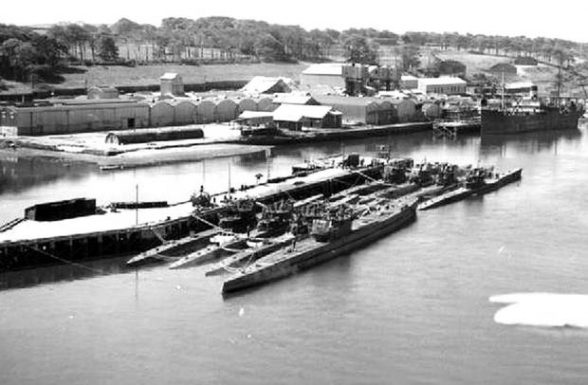
The German U Boat fleet surrendered at Lisahally port in May 1945
THE success of the U Boat Surrender commemoration events last weekend helped put the spotlight on an important aspect of the city’s unique maritime heritage.
Derry’s strategic location as the most westerly base of the Allied Forces during the Second World War meant the city played a leading role in the Battle of the Atlantic.
The U boat surrender at Lisahally in May 1945 acknowledged Derry’s pivotal role as an Allied base and was a major turning point of the war.
The arrival of tens of thousands of Allied sailors and servicemen from around the world during the war years, transformed Derry into a cultural melting point. With over 130 boats on the Foyle at one stage, people used to joke that you could cross from one side of the river to the other without ever getting your feet wet.
The U boat surrender commemoration events – including talks, displays of wartime memorabilia, demonstrations, a 1940’s photo booth and ‘Forties themed tea room in the Guildhall – were hosted by Derry City and Strabane District Council.
Margaret Edwards, Education Officer with the Council explained why the commemoration events had such wide appeal: “People who lived here during the war or who grew up listening to stories about rationing and blackouts enjoyed taking a trip back in time to reminisce.
“For the many younger people, as well as visitors to the city, who attended the weekend events, it was a chance to learn about the important role the city played in one of the most significant events in world history.
“The north west has a rich and diverse maritime heritage. We plan to build on the success of the U Boat commemoration events to reclaim this aspect of the city’s unique maritime heritage,” added Margaret.
The display of the wartime memorabilia evoked many memories. One of the visitors to climb into the cockpit of the Ulster Aviation Society’s replica Spitfire in Guildhall Square was Drumahoe octogenarian Andrew Lindsey.
Reminiscing about what it was like to live through the war he said: “The rationing didn’t really affect me as we lived on a farm but I remember children who were evacuated from Belfast coming to stay with us and going to school at Upper Cumber Elementary.
“They went home to Belfast but then the bombing started again so they came back. I remember their parents used to come and visit and one time they brought us a leather football.”
For Pearl Mowbray from the Waterside, the visit to the Guildhall reminded her of her first job collecting ration coupons: “I worked as an assistant with a wholesaler and remember having to count out the coupons when people came in to buy rationed items like sugar, butter and tea.
“It seems strange now but back then it was just part of the everyday life.”





